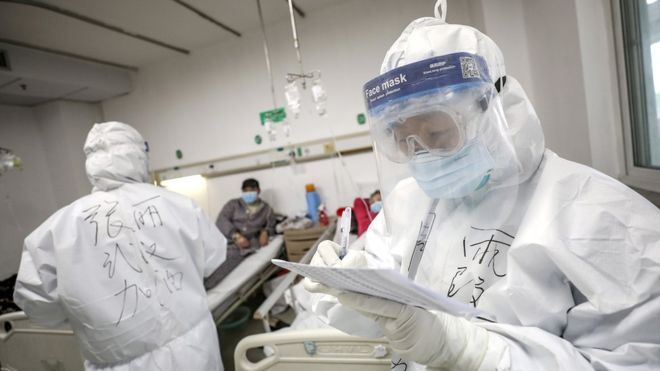China is tightening curbs on movement in Hubei province as it battles the outbreak of new coronavirus.
Sixty-million people have been told to stay at home unless there is an emergency, and the use of private cars has been banned indefinitely.
Hubei and the city of Wuhan have been hit hardest by the outbreak, which has now claimed 1,665 lives in China.
But China has announced a drop in new cases for a third consecutive day and says it is controlling the spread.
The order to stay at home does have exceptions, such as an emergency. In addition, a single person from each household will be allowed to leave the building every three days to buy food and essential items.
On housing estates, one entrance will be kept open. It will be guarded to ensure that only residents can enter or leave.
All other businesses will stay closed, except chemists, hotels, food shops and medical services.
Foreign Minister Wang Yi also said that along with a drop in infections within Hubei there had been a rapid increase in the number of people who had recovered.
Meanwhile, authorities in the capital, Beijing, have ordered everyone returning to the city to go into quarantine for 14 days or risk punishment.
READ ALSO: Coronavirus: First Death Confirmed In Europe
China’s central bank will also disinfect and store used banknotes before recirculating them in a bid to stop the virus spreading.
On Sunday, authorities reported 2,009 new cases – down from 2,641 on Saturday, and 5,090 the day before.
New cases spiked earlier in the week after a change in the way they were counted but have been falling ever since. In total 68,500 people have so far been infected in China.
National Health Commission spokesman Mi Feng said the figures showed China was managing to curb the outbreak.
“The effects of epidemic prevention and control in various parts of the country can already be seen.”
The commission’s daily bulletin also reported 142 more deaths nationwide, the vast majority in Hubei.
The proportion of infected patients considered to be in a “serious condition” has dropped nationwide from more than 15% to just over 7%, according to China’s State Council.
Taiwan has now reported a death from the illness – a man, 61, who had not travelled abroad recently but had diabetes and hepatitis B, Health Minister Chen Shih-chung said.
The minister said many of the driver’s passengers had come from China.
Outside China there have been more than 500 cases in nearly 30 countries. Four others have died outside China – in France, Hong Kong, the Philippines and Japan.












